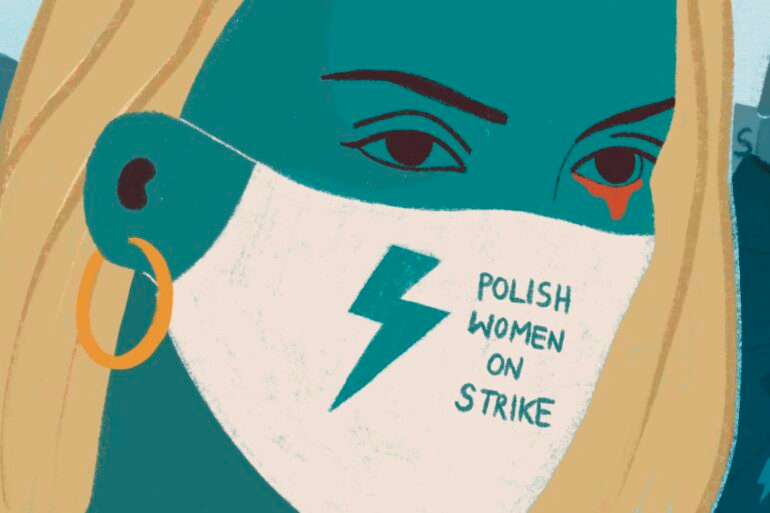Amazon. Love the convenience – hate the exploitation. Over three years, the delivery monopoly stole $62 million in tips from its drivers. And yet, even as a young pro-worker advocate, who has also worked as a delivery driver, I still end up giving them my money for junk like this incredible yet utterly unnecessary pull-string onion dicer.

A 2019 study found that Amazon has “aggressively avoided” paying $100 billion in taxes since 2010, effectively stealing the roads, security, and public education from the labour force they relied on to deliver all my cheesy graphic tees. Some Amazon warehouses fire workers the week before they earn full-time benefits while hiding their holiday pay, and drivers report having to urinate in bottles and go over the speeding limit in order to meet impossible quotas. And yet, millions of us look past all this to get fresh groceries delivered the same-day.
So we have a problem. Amazon commits countless examples of abuse and exploitation and largely gets away with it. Even those more aware consumers still turn to Amazon when there’s no alternative. Anyway, telling consumers to “vote with your dollar” can only go so far without systemic change. At this point we’re not going to successfully boycott Amazon, and we shouldn’t have to in order to have an equitable online economy.
This begs the question: is this convenience possible without all the exploitation? Sure it is. Why the hell wouldn’t it be? In fact, we could turn Amazon into a force for local economies instead of one that obliterates them.
The technology has already been developed, the infrastructure has already been built, and the labour force already knows how to keep the machine running. So why does this service need to be so privately owned? Why do we trust this corporation that won’t even tell us how often it’s been subpoenaed for its Ring Doorbell surveillance footage? Their $200 million CIA contract in 2014 ballooned to $2 billion in 2019, offering data services for police departments, federal law enforcement, national intelligence agencies, and immigration authorities. It’s getting creepy.
Okay, only two more spooky Amazon facts ‒ I promise. A 2016 report found that nearly half of every dollar spent online in the US went to Amazon. With their profits astronomically increasing since the pandemic, that number is projected to be even more monopolous in 2021. That’s a lot of economic power to be wielded against the mythical free market. In the not-so-free market of our reality, Amazon has used their stronghold in online sales to drastically hike seller fees from 19% to 30% in just five years. So Amazon needs to be broken up, right? Wrong! Believe it or not, the radical socialist in me believes Amazon should have even more of the share of online sales.
The solution to exploitation isn’t to have two or three Amazons for customers to waste time scouring the endless search results of, trying tediously to vote with their dollar for the least harm done. The solution to exploitation is to stop the exploitation. It really is that simple. Attack the problem at its source ‒ the profit motive. Why do people abuse good, honest workers and destroy our environment? The answer is always money.
Here, I present the case for nationalising Amazon. Public ownership of the shipping and logistics service would cost less for consumers (no more 30% sales fees to further enrich Jeff Bezos) and end the brazen exploitation. If we like Amazon so much, we should pay for it. And over half of American households already “pay for it” with their Prime subscriptions. Just change that subscription to a tax. After all, taxes are basically just subscriptions to public services. And from there, we the people would have control of our ever-growing online economy, instead of yielding that power to the unelected dictator-like owners of Amazon.
First and foremost, for the workers, whose labour built this massive machine of modernity, we owe everything. Without massive cuts of Amazon’s hundreds of billions of dollars of profits going to Jeff Bezos and his acolytes of shareholders, generous worker pay, benefits, and pensions can be afforded. More jobs can be created by hiring more workers, boosting the economy while making the work less demanding. Then whatever profit is left can be put into reducing fees for sellers, lowering costs for consumers, and rebuilding infrastructure used by Amazon deliveries like roads.
With worker exploitation out of the way, the possibilities are endless and should remain so.
There’s not going to be a one-size-fits-all approach to the uses for a public shipping and warehousing service, and each city, state, and country should democratically decide what suits their needs best. For example, rural areas that are harder to ship to could decide to display local search results first in an effort to reduce shipping costs and carbon emissions while boosting their local economy. Cities could incorporate farmers’ markets into grocery options. Alternatively, countries could use the platform to allow consumers to buy directly from international suppliers, cutting out the excess cost, labor, and shipping pollution of various middlemen. We could also vote to make every product on Amazon display its city of origin and worker pay to help consumers make informed decisions.
There’s so much good that can be done with some cooperation and democracy here. The only criticism I can think of is that old capitalism breeds innovation meme. How will Amazon keep innovating its service without being rewarded with mass exploitation of the working class? Even if ‒ and that’s a big if ‒ we need capitalism in order to innovate an automated warehouse drone for example, that could still be developed and sold by a private firm. There really isn’t an argument here when you peel off the scabs of Red Scare propaganda, whose intellectual injuries left the public so subservient to private industry. It’s time to just do what makes sense.















